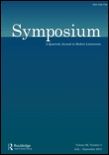
SYMPOSIUM-A QUARTERLY JOURNAL IN MODERN LITERATURES
Scope & Guideline
Fostering Innovative Perspectives in Literature
Introduction
Aims and Scopes
- Interdisciplinary Literary Analysis:
The journal promotes an interdisciplinary approach, integrating literary studies with cultural, historical, and political contexts, allowing for a nuanced understanding of texts. - Focus on Global and Transnational Literature:
It emphasizes the importance of global perspectives in literature, exploring how cultural exchanges influence literary production across different regions. - Exploration of Identity and Representation:
A significant area of focus is on identity formation, examining intersections of race, gender, and nationality within literary texts. - Critical Revisionism and Comparative Studies:
The journal encourages critical revisionism, inviting comparative analyses of literary works that reveal underlying connections and divergences across time and space. - Integration of New Media and Technology:
There is a consistent engagement with the impact of new media and technology on literature, reflecting on how these elements shape narratives and reader interactions.
Trending and Emerging
- Eco-Criticism and Environmental Narratives:
There is a growing interest in eco-fiction and narratives addressing environmental concerns, reflecting an urgent need to engage with ecological issues in literature. - Post-Colonial and Decolonial Perspectives:
Post-colonial studies are gaining momentum, with an emphasis on decolonial approaches that interrogate power dynamics and cultural representation in literature. - Digital Humanities and Literature:
The intersection of digital humanities and literature is emerging as a significant theme, focusing on how technology reshapes literary analysis and access to texts. - Globalization and Cultural Exchange:
The impact of globalization on literature is increasingly highlighted, examining how cultural exchanges influence narrative forms and themes. - Narratives of Migration and Displacement:
Themes surrounding migration, displacement, and diaspora are prominently featured, addressing contemporary socio-political issues through literary lenses.
Declining or Waning
- Traditional Canonical Literature:
There has been a noticeable decrease in focus on traditional canonical texts, indicating a shift towards more contemporary and diverse literary voices. - Historical Literary Criticism:
Interest in strictly historical literary criticism seems to be declining, as the journal increasingly prioritizes contemporary issues and interdisciplinary approaches. - Formalism and Structuralism:
The prevalence of formalist and structuralist analyses has decreased, suggesting a move towards more contextually grounded and politically engaged literary critiques. - Regionalism in Literature:
While regional studies were once prominent, there appears to be a decline in articles focusing exclusively on regional literary movements, as the journal embraces broader global narratives. - Traditional Gender Studies:
The exploration of gender in literature is evolving; traditional gender studies frameworks are being replaced by more dynamic discussions around intersectionality and fluidity.
Similar Journals

ROMANISTISCHE ZEITSCHRIFT FUR LITERATURGESCHICHTE-CAHIERS D HISTOIRE DES LITTERATURES ROMANES
Advancing Scholarship in the Realm of Romance LiteraturesROMANISTISCHE ZEITSCHRIFT FUR LITERATURGESCHICHTE-CAHIERS D HISTOIRE DES LITTERATURES ROMANES, published by Universitätsverlag C Winter Heidelberg GmbH, represents a significant contribution to the field of literary studies, focusing on the intricate histories of Romance literatures. With an ISSN of 0343-379X and an E-ISSN of 2509-7474, this journal strives to foster critical discourse among scholars, professionals, and students interested in literature and literary theory. Although its coverage in Scopus was discontinued in 2018, and it currently lacks open access options, the journal's past contributions have established it as a noteworthy resource, with a Scopus rank that reflects its engagement with the arts and humanities. The journal's unique scope, which spans various periods and styles, encourages interdisciplinary approaches and invites submissions that explore the evolution and impact of Romance literature across cultures. As a critical platform for emerging and established voices in the field, the ROMANISTISCHE ZEITSCHRIFT continues to be a valuable asset for those dedicated to the scholarship of literary history.

NEUE RUNDSCHAU
Bridging the Gap Between Text and PerformanceNEUE RUNDSCHAU is a prominent journal published by S Fischer Verlag GmbH, specializing in the fields of literature and literary theory, as well as visual arts and performing arts. With its roots tracing back to its inception in 1969, this journal has evolved significantly, providing a platform for critical discourse and innovative scholarship in the arts and humanities. Although it experienced coverage changes, the journal remains a vital resource for researchers and academics, contributing to the rich dialogue surrounding cultural studies and artistic expression. Furthermore, while it is not available through open access, NEUE RUNDSCHAU offers essential insights into contemporary literary trends and artistic movements, ensuring its relevance and importance within the academic sphere. With Scopus rankings including a position in the 16th percentile for literature and literary theory, and a 10th percentile placement in cultural studies, the journal embodies a commitment to quality scholarly contributions, making it an invaluable asset for students, professionals, and researchers alike.
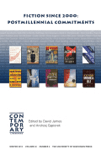
CONTEMPORARY LITERATURE
Exploring the Evolution of Literary VoicesCONTEMPORARY LITERATURE, published by the prestigious University of Wisconsin Press, stands as a vital platform for scholars and enthusiasts within the field of literary studies. With its ISSN 0010-7484 and E-ISSN 1548-9949, this journal has established itself as a respected source of innovative research across various dimensions of literature and literary theory. Holding an impressive Q2 ranking in the 2023 category of Arts and Humanities, this publication not only reflects current trends but also fosters critical discourse around contemporary authors and movements from 2002 to 2024. Engaging articles submitted to CONTEMPORARY LITERATURE enhance our understanding of narrative forms and their cultural relevance, making it an essential read for academics, professionals, and students alike. While the journal is not open access, its impact within the literary community continues to grow, as evidenced by its Scopus rank of #616 out of 1106. For those dedicated to exploring the evolving landscape of literature, CONTEMPORARY LITERATURE is a must-have in one's scholarly toolkit.

JOURNAL OF MODERN LITERATURE
Exploring the Depths of Modern Literary DiscourseJOURNAL OF MODERN LITERATURE, published by Indiana University Press, is a distinguished peer-reviewed journal that delves into critical examinations of modern literary texts and theories. Since its inception, the journal has served as a vital platform for scholars dedicated to the exploration of contemporary literature, making significant contributions to the discourse within the field. With an impressive ranking of Q2 in the Literature and Literary Theory category as of 2023, it positions itself among the top-tier journals in its domain, reflecting its strong impact within academic circles. This journal not only fosters scholarly dialogue but also embraces innovative approaches to literary criticism, ensuring relevance in today’s dynamic cultural landscape. Researchers, professionals, and students will find a rich repository of articles that engage with various modern literary paradigms, enhancing their understanding and appreciation of the intricate relationships between literature and broader socio-cultural contexts. Though it does not operate under an open access model, the journal's extensive reach through its digital ISSN (1529-1464) and print ISSN (0022-281X) allows for valuable insights to be disseminated to the appropriate audiences.

Jordan Journal of Modern Languages & Literature
Bridging Theory and Practice in Modern LanguagesJordan Journal of Modern Languages & Literature is a prestigious academic journal published by Yarmouk University, Deanship of Research & Graduate Studies. This journal serves as a vital platform for scholars and researchers in the fields of linguistics and literature, offering a well-rounded examination of modern languages and literary theory. With an impressive Q2 ranking in Linguistics and Language and a Q1 distinction in Literature and Literary Theory as of 2023, it consistently features high-quality research that contributes to the advancement of knowledge in these domains. The Scopus rankings further reflect its academic rigor, placing it in the 79th percentile for Literature and Literary Theory and maintaining significant influence in related fields, making it an essential resource for researchers, professionals, and students alike. Although it does not operate under an open-access model, the journal's commitment to publishing groundbreaking studies can significantly aid in the understanding and progression of modern linguistic and literary practices. The Jordan Journal of Modern Languages & Literature continues to be an influential voice in fostering scholarly dialogue and advancing research in the humanities.
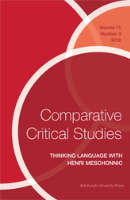
Comparative Critical Studies
Connecting Contemporary Scholarship with Literary HeritageComparative Critical Studies, published by Edinburgh University Press, is a distinguished journal that serves as a vital platform for scholarly discourse in the fields of Cultural Studies and Literature and Literary Theory. Since its inception in 2004, this peer-reviewed journal has garnered significant recognition, achieving a Q2 rating in Cultural Studies and a prestigious Q1 rating in Literature and Literary Theory according to the 2023 Category Quartiles. With its focus on comparative analyses and interdisciplinary approaches, the journal engages a wide range of perspectives from contemporary scholarship, exploring the intricacies of cultural and literary phenomena. Researchers, professionals, and students alike will find value in its rich repository of critical insights, contributing to a deeper understanding of the global literary landscape. Although the journal operates on a traditional subscription model, it remains accessible to a broad audience, creating opportunities for innovative dialogues and collaborations in the evolving fields of literary and cultural studies. Located in the heart of Edinburgh, a city renowned for its rich literary heritage, the journal continues to foster an environment of academic excellence and cultural critique.
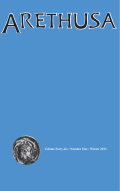
ARETHUSA
Connecting Scholars Through Rigorous Research and DebateARETHUSA, published by the Johns Hopkins University Press, is a prestigious journal that aims to foster dialogue and scholarship in the fields of Classics, Cultural Studies, and Literature and Literary Theory. Since its inception, it has been recognized for its profound impact on academic research, reflected in its Q2 rankings across multiple categories. With an ISSN of 0004-0975 and an E-ISSN of 1080-6504, ARETHUSA embraces a comprehensive scope that encourages innovative discourse and critical analysis from 1974 through to 2024. Although the journal does not offer open access, its rigorous selection process ensures that only the highest quality research is published, making it a vital resource for scholars, professionals, and students dedicated to advancing knowledge in these interconnected disciplines. The journal's commitment to excellence is further demonstrated by its standing in various Scopus rankings, reinforcing its significance in the scholarly community.
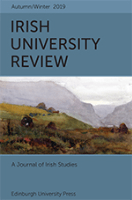
IRISH UNIVERSITY REVIEW
Illuminating Contemporary and Historical Literary NarrativesIRISH UNIVERSITY REVIEW is a distinguished academic journal published by Edinburgh University Press, specializing in the fields of Literature and Literary Theory. With an ISSN of 0021-1427 and an E-ISSN of 2047-2153, this journal serves as a vital platform for scholarly discourse on contemporary and historical literary studies related to Ireland and its cultural contexts. Located in the United Kingdom, the journal has achieved an impressive Q2 ranking in the 2023 category of Literature and Literary Theory, placing it in the 81st percentile among peer-reviewed arts and humanities journals globally, as per Scopus rankings. IRISH UNIVERSITY REVIEW is committed to fostering academic excellence and offers a range of access options for its readers, promoting both traditional and digital scholarship. With a publication timeline extending from 2002 to 2024, the journal is dedicated to enhancing understanding and appreciation of Irish literature through critical essays, reviews, and innovative research, making it an essential resource for researchers, professionals, and students alike.
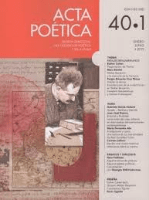
Acta Poetica
Unveiling the Rich Tapestry of Cultural StudiesActa Poetica is a distinguished open-access journal dedicated to advancing research and scholarship in the fields of Cultural Studies and Literature and Literary Theory. Published by the Universidad Nacional Autónoma de México through its Instituto de Investigaciones Filológicas, this journal has been a pivotal platform for the dissemination of literary discourse since it embraced open access in 1979. With a notable presence in both the social sciences and humanities, Acta Poetica has earned a ranking of Q3 and Q2 in the 2023 category quartiles, reflecting its commitment to quality scholarship. The journal invites contributions from researchers, professionals, and students alike, fostering a rich dialogue that explores the nuances of literary criticism and cultural phenomena. With its ISSN 0185-3082 and E-ISSN 2448-735X, the journal aims to make valuable research accessible to a global audience, continuing its legacy of enhancing literary scholarship from its base in Mexico City.
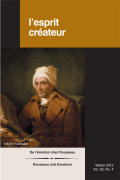
ESPRIT CREATEUR
Unveiling New Insights into Literary StudiesESPRIT CREATEUR is a prestigious journal published by the Johns Hopkins University Press, renowned for its contributions to the fields of Literature and Literary Theory. Since its inception in 2002, the journal has become a vital platform for innovative scholarly discourse, achieving an impressive Q2 classification in the 2023 category rankings and a respectable rank of #546 out of 1106 in the Scopus Arts and Humanities - Literature and Literary Theory sector, situating it within the 50th percentile of the discipline. The journal's blend of critical perspectives offers readers insights into contemporary literary analysis and theory, making it essential for researchers, professionals, and students alike. Though it currently adheres to traditional access models, its commitment to fostering high-quality, peer-reviewed scholarship cements its status as a leading voice in literary studies, enhancing its role in academic research and education.